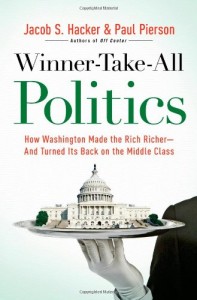 I had looked forward to reading Winner-Take-All Politics: How Washington Made the Rich Richer–and Turned Its Back on the Middle Class
I had looked forward to reading Winner-Take-All Politics: How Washington Made the Rich Richer–and Turned Its Back on the Middle Class. The authors are political scientists Paul Pierson and Jacob S. Hacker.
On the whole it was less trenchant than I had hoped it would be. It does, however, thoroughly document one very good point: US income inequality is not — or not simply – due to the economic consequences of globalization, like the shift from manufacturing jobs to service sector jobs, with the ensuing loss of pay and benefits. It’s also due to what’s happened in American politics. Business interests — represented by Republicans — have been much better at organizing themselves than have labor unions and interest groups that represent the middle class. And the cost of campaigning – which increased enormously once TV became the dominant campaign medium – has made Democrats willing to support legislation that favors the interests of those with money to spare.
Political gridlock
From a review of the book in The Christian Science Monitor:
The Republicans, according to Hacker and Pierson, by marrying populist rhetoric to elite action, have been able to stitch together a constituency that includes moderate income supporters – Christian conservatives, tea partyers, and elite-wary blue-collar workers – while pursuing policies catering almost exclusively to business and moneyed elites. If the middle class, and below, is getting the short end of the economic stick from Washington, the Republicans blame it on the “tax and spend” Democrats, whose policies are actually more in tune with Middle America.
If there currently is gridlock in the Capitol because a super-majority of 60 senators in the Senate is needed to move reform legislation, the voters, the polls show, seem to be blaming the current Democratic majority rather than the obstructionist Republican minority. How can this be? Because, according to the authors, the GOP, in league with the wealthy and big business, has mastered the art of political organization and fundraising since this “30 Years War” began in earnest circa 1980. “Banks are organized; their customers are not,” they write, citing one example of the uneven political playing field.
The diseased condition of the American body politic
Here’s an excerpt from a review in Foreign Affairs.
[B]y the late 1970s, dissatisfaction with the state of the government, politics, and policy was rampant across the board, among the wealthy and the middle class alike, and the conditions were ripe for a turn against the political status quo. Conservatives, on behalf of the wealthy, were ready with ideas and organization to seize the moment. Progressives and the middle class were not, and so began the spiral toward the winner-take-all game that Hacker and Pierson describe.
Like many social critics, Hacker and Pierson are long on diagnosis and rather short on treatment. Not surprisingly, they emphasize rebuilding the organizational capacity of the middle and working classes as the place to start repairing the infrastructure of American politics, neither a terribly precise prescription nor a route to a quick cure. But if they are right — and theirs is a compelling case — the task of restoring some sense of proportion and balance to the winner-take-all political economy is essential if the American body politic is to recover from its current diseased condition.
Next on my reading list on the topic of inequality (not just economic): The Twilight of Equality?: Neoliberalism, Cultural Politics, and the Attack on Democracy by Lisa Duggan.
Related posts:
The dismal future of unemployment
Life expectancy of the rich and the poor
The end of the American dream?
Health inequities: An inhumane history
Resources:
Image: Intraspec
Paul Pierson and Jacob S. Hacker, Winner-Take-All Politics: How Washington Made the Rich Richer–and Turned Its Back on the Middle Class
Robert C. Lieberman, Why the Rich Are Getting Richer: American Politics and the Second Gilded Age, Foreign Affairs, January/February 2011
David Holahan, Winner-Take-All Politics: Why do the rich get richer? These authors blame the Republicans, The Christian Science Monitor, September 16, 2010


Sorry, comments are closed for this post.